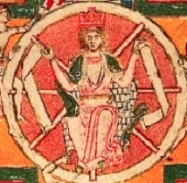| directory |
| home | contact |
|
|||||||||||||||
| search | |||||||||||||||
Shakespeare on FateWe have a Roman scholar named Boethius to thank for the medieval and Renaissance fixation on "fortune's wheel." Queen Elizabeth herself translated his hugely popular discourse on fate's role in the Universe, The Consolation of Philosophy. Although the idea of the wheel of fortune existed before Boethius, his work was the source on the subject for Chaucer, Dante, Machiavelli, and of course, Shakespeare. In the words of Boethius:With domineering hand she moves the turning wheel, Shakespearean Quotations on FatePlease see the plays section for full explanatory notes.____ Our remedies oft in ourselves do lie, Which we ascribe to heaven: the fated sky Gives us free scope, only doth backward pull Our slow designs when we ourselves are dull. (All's Well that Ends Well, 1.1.209), Helena Let us sit and mock the good housewife Fortune from her wheel, that her gifts may henceforth be bestowed equally. (As You Like It, 1.2.30), Celia to Rosalind Wear this for me, one out of suits with fortune. (As You Like It, 1.2.224), Rosalind, giving Orlando her necklace. My fate cries out, And makes each petty artery in this body As hardy as the Nemean lion's nerve. (Hamlet, 1.4.91), Hamlet [You live] in the secret parts of Fortune? O, most true; she is a strumpet. (Hamlet, 2.2.235), Hamlet to Guildenstern Our wills and fates do so contrary run That our devices still are overthrown; Our thoughts are ours, their ends none of our own. (Hamlet, 3.2.208), Player King You must sing a-down a-down, An you call him a-down-a. O, how the wheel becomes it! It is the false steward, that stole his master's daughter. (Hamlet, 4.5.176), Ophelia There's a special providence in the fall of a sparrow. If it be now, 'tis not to come; if it be not to come, it will be now; if it be not now, yet it will come: the readiness is all: since no man has aught of what he leaves, what is't to leave betimes? (Hamlet, 5.2.214), Hamlet to Horatio Giddy Fortune's furious fickle wheel, That goddess blind, That stands upon the rolling restless stone. (Henry V, 3.3.27), Pistol to Fluellen What fates impose, that men must needs abide; It boots not to resist both wind and tide. (3 Henry VI, 4.3.60), King Edward IV to Warwick O God! that one might read the book of fate, And see the revolution of the times Make mountains level, and the continent, Weary of solid firmness, melt itself Into the sea! and, other times, to see The beachy girdle of the ocean Too wide for Neptune's hips; how chances mock, And changes fill the cup of alteration With divers liquors! (2 Henry IV, 3.1.46), King Henry IV Men at some time are masters of their fates: The fault, dear Brutus, is not in our stars, But in ourselves, that we are underlings. (Julius Caesar, 1.2.146), Cassius to Brutus It is the stars, The stars above us, govern our conditions. (King Lear, 4.3.37), Kent The wheel is come full circle. (King Lear, 5.3.203), Edmund The sea will ebb and flow, heaven show his face, Young blood doth not obey an old decree: We cannot cross the cause why we were born. (Love's Labour's Lost, 4.3.203), Biron That I may pour my spirits in thine ear; And chastise with the valour of my tongue All that impedes thee from the golden round, Which fate and metaphysical aid doth seem To have thee crown'd withal. (Macbeth, 1.5.27), Lady Macbeth I fear too early, for my mind misgives Some consequence, yet hanging in the stars Shall bitterly begin his fearful date With this night's revels, and expire the term Of a dispised life, clos'd in my breast, By some vile forfeit of untimely death. But he that hath the steerage of my course Direct my sail. (Romeo and Juliet, 1.4.113), Romeo O, I am fortune's fool! (Romeo and Juliet, 3.1.139), Romeo O God, I have an ill-divining soul! (Romeo and Juliet, 3.5.55), Juliet. Romeo actually speaks this line in Q2. O fortune, fortune! all men call thee fickle: If thou art fickle, what dost thou with him. That is renown'd for faith? Be fickle, fortune; For then, I hope, thou wilt not keep him long, But send him back. (Romeo and Juliet, 3.5.59-63), Juliet When in disgrace with fortune and men's eyes I all alone beweep my outcast state. (Sonnet 29) By accident most strange, bountiful Fortune, Now my dear lady, hath mine enemies Brought to this shore; and by my prescience I find my zenith doth depend upon A most auspicious star, whose influence If now I court not but omit, my fortunes Will ever after droop. (The Tempest, 1.2.209), Prospero to Miranda The providence that's in a watchful state Knows almost every grain of Plutus' gold, Finds bottom in the uncomprehensive deeps, Keeps place with thought and almost, like the gods, Does thoughts unveil in their dumb cradles. There is a mystery--with whom relation Durst never meddle--in the soul of state; Which hath an operation more divine Than breath or pen can give expressure to. (Troilus and Cressida, 3.3.207), Ulysses to Achilles My stars shine darkly over me: the malignancy of my fate might perhaps distemper yours. (Twelfth Night, 2.1.3), Sebastian to Antonio) References Boethius. The Consolation of Philosophy. Trans. V.E. Watts. London: Penguin Books, 1969. _____ Related Articles |
In the Spotlight
|
©1999-2021 Shakespeare Online. All Rights Reserved.
 There's a Divinity that shapes our ends,
There's a Divinity that shapes our ends,